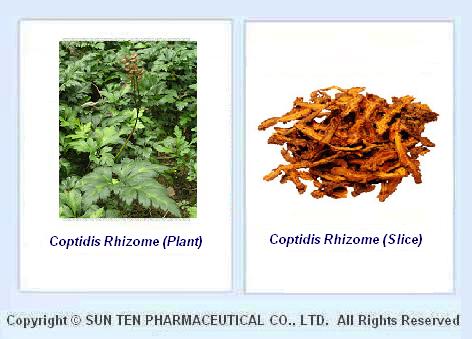Coptis Rhizome (Rhizoma Coptidis; Huang Lian)
TCM Herbal Story
Coptis Rhizome (Rhizoma Coptidis; Huang Lian)
Long ago, there was a famous Chinese practitioner in Ba Shan named Jiang who had a garden filled with hundreds of medicinal herbs. When Dr. Jiang was away to practice medicine in other villages, he hired a young worker named Huang to take care of the garden during his absence.
One morning in January, Huang found a plant with greenish white flowers near the mountain paths. Amazed by the fact that the plant could survive on such harsh weather, he moved this plant into the herbal garden for cultivation.
One day, Dr. Jiang’s daughter, Ru Ru, became sick all of the sudden for no reason. Her symptoms include fever, vomiting, and diarrhea, and was unconscious after two to three days. Since Dr. Jiang was away, Ru Ru’s mother consulted several doctors for treatment. However, instead of seeing improvements on the symptoms, Ru Ru’s conditions worsened, and the doctors believed that this illness was very likely to cost her life.
Huang was also very worried. He then recalled the plant he found with greenish white flowers and cooked some of it with water. Miraculously, Ru Ru’s symptoms were relieved after taking the plant, and was completely recovered after taking it for two more times.
When knowing this incident after his return, Dr. Jiang suspected that this plant had the ability to clear heat and remove toxins. He then performed several studies to confirm the property of the plant, and named this plant Huang Lian after the worker. In order to express his gratitude to Huang on saving her daughter’s life, Dr. Jiang also betrothed Ru Ru to Huang.
Coptidis Rhizome is the rhizome of Coptis chinensis Franch. Its properties are bitter and cold. It enters through the heart, large intestine, liver, and stomach.
Actions & Indications:
- Drains fire and relieves toxicity.
- Clears heat and drains dampness.
- Clears heart fire.
- Clears heat and stops bleeding.
- Drains stomach fire.
- Clears heat topically.
Caution & Contradiction
- Contraindicated in cases of yin deficiency, nausea or vomiting due to Stomach cold from deficiency, and diarrhea due to Spleen or Kidney deficiency.
- Long term use is discouraged as it can injure the Spleen and Stomach.
The original article is from Brion Research Institute, translated by Sun Ten Pharmaceutical Co., Ltd.
For Chinese/original version, please go to:
http://www.brion.org.tw/index.php?option=com_content&task=view&id=2971
